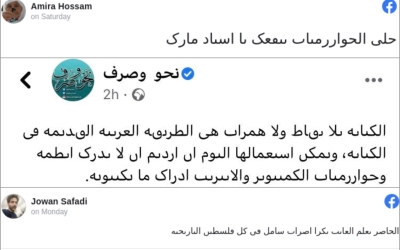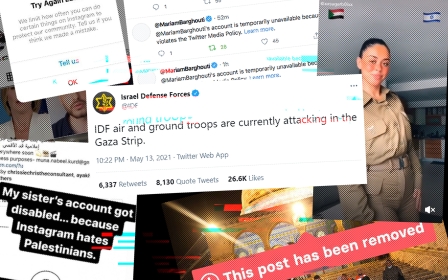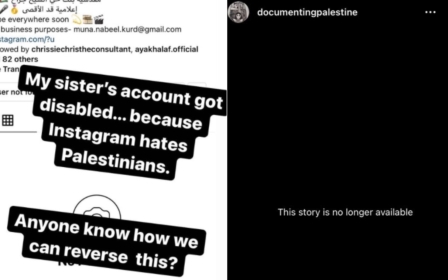Progressive Democrat tells social media platforms to stop censoring Palestinian voices
US Congresswoman Rashida Tlaib has accused leading social media platforms of censoring Palestinian political speech, as criticism grows over the suppression of content critical of Israel during its recent offensive on the besieged Gaza Strip.
In a letter sent to the public policy heads at Twitter, Facebook, Instagram and Tiktok, Tlaib, a Palestinian American, asked the platforms "to cease censorship and ensure Palestinian voices are heard".
Tlaib cited a report released last week by 7amleh, a nonprofit that focuses on Palestinians' digital rights, that highlighted more than 500 incidents in which Palestinian political speech had been censored during the recent upheaval that took place in Israel and the occupied Palestinian territories this month.
Tlaib accused the platforms of deleting posts and accounts as well as restricting the outreach of pro-Palestinian content and hiding activists' hashtags.
New MEE newsletter: Jerusalem Dispatch
Sign up to get the latest insights and analysis on Israel-Palestine, alongside Turkey Unpacked and other MEE newsletters
'Automated biases'
The first Palestinian American woman ever elected to US congress, Tlaib told the social media companies that she had received scores of similar complaints from voters.
"My email inbox has been filled with reports of your companies improperly removing and suspending posts and accounts highlighting Israeli apartheid violence against the Palestinian people," Tlaib wrote.
"I understand that your companies have acknowledged that these removals and suspensions have indeed been occurring and are attributing them to systematic errors. It is not enough to continue to blame technical errors by automated systems and algorithms. I know that these processes and systems have humans who create and maintain them; thus, biases are automated as well," she continued.
Last week, Palestinian data rights group Sada Social, along with two news agencies and a translator, filed a 14-page legal complaint with Facebook, saying the social media giant censored their posts and, in some cases, shut down their accounts in violation of the company's own policies.
The complaint, sent to the UN Special Rapporteur on Freedom of Opinion and Expression and seen by Middle East Eye, gave the company 21 days to explain why posts and accounts were shut down before further action, including potential litigation, would be taken.
Palestinian activists have complained of censorship for years, but an increase in such reports was noted at the start of May when tensions in occupied East Jerusalem were just heating up over Israel's latest attempt to forcibly evict Palestinian families from their homes.
During the first few days of unrest, hundreds of people had already shared screenshots of their suspended accounts and blank screens after they had shared posts related to the forced evictions of Palestinian families in Sheikh Jarrah.
At the time, Mona Shtaya, local advocacy manager at 7amleh, told MEE that Israeli cyber units generally send tens of thousands of takedown requests to social media companies in an attempt to silence Palestinians. In 2019 alone, her organisation documented 19,606 such requests.
'A disturbing double-standard'
In her letter on Tuesday, Tlaib noted pressure put on social media platforms from the Israeli government, highlighting its attempts to get such companies to adopt the controversial International Holocaust Remembrance Alliance (IHRA) definition of antisemitism, which has been used to criminalise pro-Palestinian initiatives such as the non-violent and Palestinian-led Boycott, Divestment and Sanctions (BDS) movement.
According to documents outlining Facebook’s content policies leaked to The Intercept earlier this month, the company appears to have already adopted part of the IHRA definition, in that its policy seemingly equates the word "Zionist" with "Jew" in some contexts - a policy Tlaib described as "false and dangerous".
"The liberation movement for Palestine is centered on equality and justice for all people, regardless of religion and is proud to stand with all people of Jewish faith in the face of the disgusting surge in hateful, anti-Semitic attacks against them," Tlaib wrote.
'How can Facebook justify censoring peaceful Palestinian voices while providing [a platform] for extremist hate'
- Rashida Tlaib, House representative
The congresswoman also pointed out what she called "a disturbing double-standard" laid out in a New York Times article that described the way far-right Israeli groups had been using Facebook-owned WhatsApp to coordinate violent mob attacks on Palestinians.
"I cannot understand how Facebook can justify censoring peaceful Palestinian voices while providing an organizing platform for extremist hate," she said.
Facebook has acknowledged that there had been "several issues" affecting people's ability to share Palestinian content on its apps, including an error that temporarily blocked content from being viewed on an al-Aqsa Mosque hashtag page and a glitch that affected Instagram stories.
"While these have been fixed, they should never have happened in the first place," spokesperson Andy Stone told NBC News, regarding Tlaib's complaints.
"We're so sorry to everyone who felt they couldn’t bring attention to important events, or who felt this was a deliberate suppression of their voice. This was never our intention - nor do we ever want to silence a particular community or point of view."
Middle East Eye delivers independent and unrivalled coverage and analysis of the Middle East, North Africa and beyond. To learn more about republishing this content and the associated fees, please fill out this form. More about MEE can be found here.





